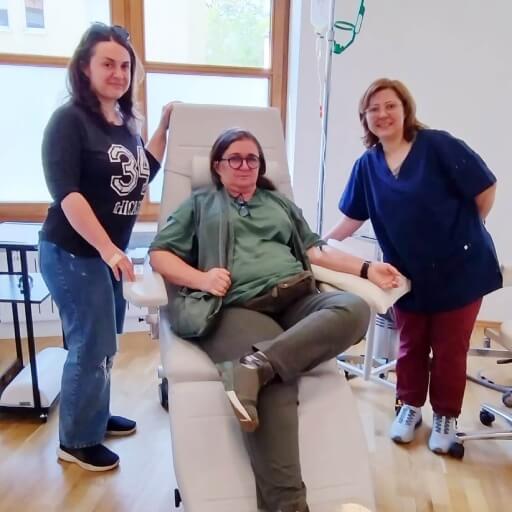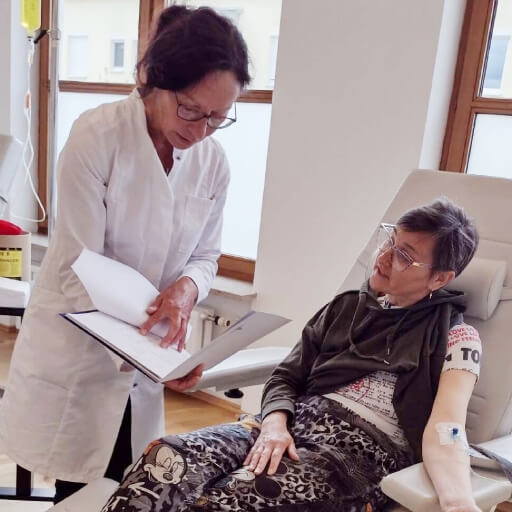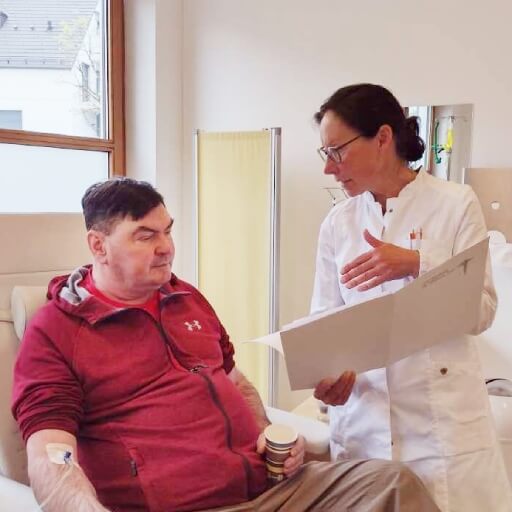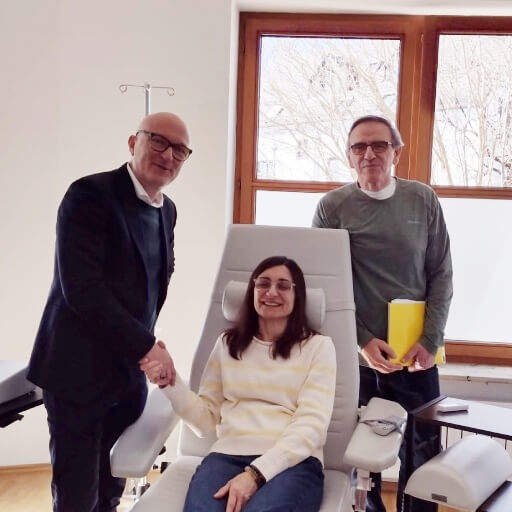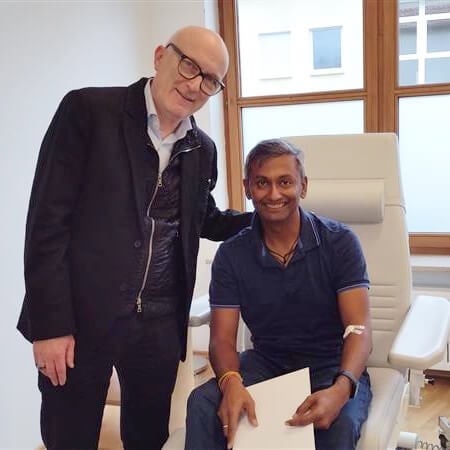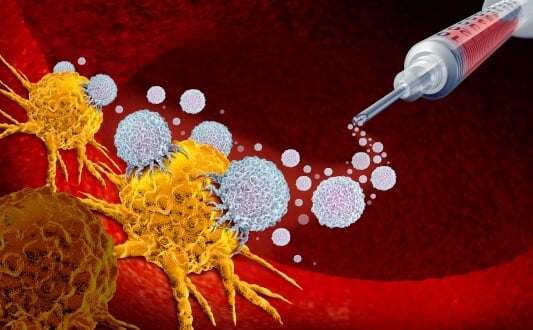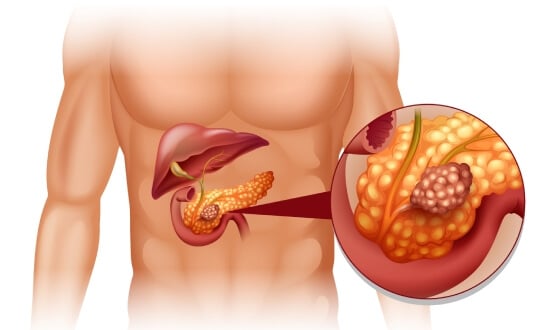Диагноз рак поджелудочной железы зачастую воспринимается как приговор, но это не так. В клиниках Германии доступны инновационные медицинские разработки, открывающие новые возможности для онкобольных, у которых стандартные подходы к лечению не дают желаемого результата. В центрах по лечению рака поджелудочной железы в Германии пациентам с ограниченными возможностями лечения предлагаются новаторские терапевтические подходы с научно доказанной эффективностью. В подобных медучреждениях важное значение также придается заботливому уходу за онкобольным, учитываются его индивидуальные потребности и пожелания. Инновационное лечение рака поджелудочной железы в Германии в комплексе с междисциплинарным подходом к терапии обеспечивает весьма хорошие результаты. Более того, зачастую такой вариант лечения является единственной возможностью спасти пациенту жизнь.
Общие данные о раке поджелудочной железы и особенностях этого заболевания
Рак поджелудочной железы является одной из самых серьезных проблем современной медицины. На ранних стадиях онкопатология часто протекает бессимптомно, что затрудняет ее своевременную диагностику. Ежегодно в мире диагностируется около 466 000 новых случаев рака поджелудочной железы, ввиду чего это агрессивное злокачественное заболевание является одной из основных причин смертности от рака во всем мире.
Сложность диагностики рака поджелудочной железы представляет собой главную проблему в борьбе с этим заболеванием – к моменту появления первых симптомов онкопроцесс зачастую уже распространяется за пределы поджелудочной железы. Этим объясняется низкий показатель выживаемости при данном онкологическом заболевании, составляющий всего 10-12%. Однако при выявлении рака поджелудочной железы на ранних стадиях, когда опухоль еще локализована, отмечаются значительно лучшие показатели выживаемости, что свидетельствует о важности своевременной диагностики и начала лечения.
При лечении рака поджелудочной железы в Германии пациентам предоставляются комплексные схемы с сочетанием традиционных методик лечения и инновационных видов терапии. Каждому пациенту обеспечивается медицинское обслуживание в соответствии с его индивидуальными потребностями, при этом для врачей важно не только продлить онкобольному жизнь, но и сохранить ее качество.
Традиционные подходы к лечению
В Германии лечение рака поджелудочной железы основывается на междисциплинарном подходе – в ходе терапевтического процесса сочетаются хирургические методы, передовые лекарственные препараты и высокоточные виды лучевой терапии. При локализованном раке поджелудочной железы наилучшие шансы на долгосрочное выживание обеспечивает хирургическое лечение – операция Уиппла.
Центры по лечению рака поджелудочной железы в Германии демонстрируют превосходные результаты в области проведения:
- Передовых хирургических вмешательств, обеспечивающих предельно короткие сроки восстановления в послеоперационном периоде, снижение риска развития осложнений и улучшение функциональных результатов
- Химиотерапии по индивидуально разработанной для пациента схеме, позволяющей обеспечить ему существенное улучшение показателей выживаемости и при этом сохранить достойное качество жизни
- Высокоточных видов лучевой терапии, при которых используются новейшие техники доставки излучения, обеспечивающие максимальную концентрацию дозы облучения на опухоли без вреда для здоровых соседних тканей
Отличительной чертой подхода немецких врачей к лечению рака является их приверженность к применению персонализированных схем лечения, в которых различные виды терапии применяются в синергии. Немецкие онкологи разрабатывают для каждого пациента индивидуальную схему лечения с учетом уникальных особенностей диагностированного у него заболевания, его общего состояния и личных предпочтений, что по сравнению с традиционной моделью обслуживания онкобольных обеспечивает значительно лучший результат.
Доктор Михаэль Липп о будущем сложных хирургических вмешательств в области онкологии
Инновационное лечение рака поджелудочной железы дендритными клетками
Одной из наиболее многообещающих разработок Германии в лечение рака поджелудочной железы является терапия дендритными клетками – инновационного вида иммунотерапии. Особую ценность метод имеет для пациентов, у которых традиционные протоколы лечения оказались безуспешными и не дали желаемого результата.
Первооткрывателем дендритных клеток является американский ученый Ральф Штейнман, которому в 2011 году была присвоена Нобелевская премия по медицине за эту революционную разработку. Открытие дендритных клеток в корне изменило понимание защитных механизмов иммунной системы и расширило возможности в области лечения рака.
Принцип действия терапии дендритными клетками
Принцип действия терапии дендритными клетками основан на задействовании собственной иммунной системы пациента для распознавания и уничтожения раковых клеток. Лечение проводится в несколько этапов:
- Забор клеток – производится забор образца крови пациента, из которого выделяются дендритные клетки – специализированные иммунные клетки, отвечающие за запуск в организме таргетных иммунных реакций.
- Обработка полученного биологического материала в лаборатории – дендритные клетки подвергаются специальной обработке, в ходе которой их «обучают» распознавать специфические онкомаркеры, присутствующие на поверхности раковых клеток поджелудочной железы.
- Повторное введение дендритных клеток пациенту – после специальной обработки в лаборатории дендритные клетки вводятся пациенту.
- Активация иммунной системы – дендритно-клеточная вакцина активирует цитотоксические Т-клетки, в результате чего формируется индивидуальный противораковый иммунитет.
- Формирование таргетного иммунного ответа – метод стимулирует собственную иммунную систему пациента распознавать и уничтожать злокачественные клетки во всем организме, не повреждая при этом здоровые ткани.
Клинические результаты и преимущества метода
За последнее десятилетие специализированные онкологические центры Германии усовершенствовали метод лечения дендритными клетками: были разработаны новаторские протоколы, демонстрирующие особенно многообещающие результаты у пациентов с поздними стадиями заболевания, которым не помогают традиционные виды терапии. Вакцинация дендритными клетками обладает многочисленными преимуществами:
- Обеспечивает минимальный профиль побочных эффектов по сравнению с традиционными методами лечения
- Подходит пациентам с ослабленным здоровьем
- Хорошо сочетается с другими методиками лечения
- Оказывает системный противораковый эффект на весь организм
Данные о клинических результатах лечения дендритными клетками в немецких клиниках демонстрируют обнадеживающие результаты: у некоторых пациентов наблюдается стабилизация заболевания, снижение опухолевой нагрузки и увеличение продолжительности жизни по сравнению с первоначальными прогнозами. Более того, многие пациенты сообщают об улучшении показателей качества жизни, включая более эффективное купирование болевого синдрома и сохранение функционального статуса.
Терапия дендритными клетками наглядно демонстрирует стремление немецкой медицины к объединению научных инноваций с практической пользой для пациента, ведь разрабатываемые в этой стране методы лечения нацелены не только на повышение статистики выживаемости, но и на максимальное сохранение достойного качества жизни онкобольного с диагнозом рак поджелудочной железы.
Экспертное мнение профессора Гансауге о лечении рака дендритными клетками и его преимуществах
Таргетное лечение рака методом TACE с доставкой химиопрепаратов непосредственно к опухоли
Трансартериальная химиоэмболизация (TACE) – это малоинвазивная процедура, которая в корне изменила подходы к лечению пациентов с местно-распространенным и метастатическим раком. Превосходные результаты лечения рака поджелудочной железы методом TACE свидетельствуют о ведущих позициях Германии в области интервенционной онкологии.
Двойной механизм действия метода
TACE обеспечивает двойной механизм действия, за счет которого процедура эффективно воздействует на опухолевые очаги:
- Доставка фармпрепаратов непосредственно к онкологическому очагу – интервенционные радиологи вводят катетер, который под визуальным контролем доставляется по артериальной системе непосредственно к кровеносным сосудам, питающим опухоль
- Эффективное введение лекарственных препаратов – таргетная доставка химиопрепаратов и эмболизирующих материалов к онкологическому очагу
- Двойной эффект от процедуры – обеспечивается одномоментное достижение двух целей: блокирование притока крови к опухоли и воздействие на раковые клетки высококонцентрированной дозой химиопрепаратов
Основные клинические преимущества процедуры
Лечение методом TACE обладает рядом важных преимуществ:
- Воздействие на опухоль высококонцентрированной дозой препаратов – по сравнению с системным введением химиопрепаратов обеспечивается до 20 раз более высокая концентрация лекарственных средств в онкологическом очаге
- Снижение системного воздействия химиотерапевтических препаратов – значительно меньшее негативное воздействие цитостатиков на здоровые ткани
- Минимальный профиль побочных эффектов – пациент испытывает гораздо меньше системных побочных эффектов, таких как тошнота, повышенная утомляемость и иммуносупрессия
- Таргетное действие – прицельное воздействие на онкологический очаг без повреждения соседних здоровых тканей
- Амбулаторная процедура – минимальные сроки пребывания в клинике
Усовершенствование технических возможностей для проведения процедуры TACE
В Германии лечение рака поджелудочной железы методом TACE проводится с помощью усовершенствованных техник, которые доступны здесь благодаря новаторским технологическим разработкам в области визуализационной диагностики и эмболизирующих материалов. В некоторых медучреждениях страны в настоящее время используются эмболизирующие микросферы с лекарственным покрытием, обеспечивающие контролируемое высвобождение химиопрепаратов в течение длительного времени, что дополнительно усиливает терапевтический эффект и минимизирует токсичность лечения.
Проведение TACE предполагает кратковременное пребывание в больнице – большинство пациентов покидают стационар в течение 24-48 часов. Процедура проводится малоинвазивным доступом, поэтому подходит пациентам, которые не в состоянии принести более агрессивные вмешательства, в том числе людям пожилого возраста и онкобольным с серьезными сопутствующими заболеваниями.
Для многих пациентов с неоперабельными опухолями или метастатическим раком поджелудочной железы, особенно с метастазами в печени, TACE представляет собой особо важный вариант лечения, благодаря которому можно добиться эффективного контроля над прогрессированием заболевания, облегчения симптомов и улучшения качества жизни.
Профессор Ковач: Как TACE Удваивает Выживаемость при Онкологии
Регионарная химиотерапия при раке поджелудочной железы
При регионарной химиотерапии (РХТ) концентрированные химиопрепараты доставляются непосредственно к опухолям, без повреждения здоровых органов – это революционный метод, разработанный в Германии профессором Карлом Рейнхардом Айгнером.
Германия лидирует в области регионарной химиотерапии рака поджелудочной железы благодаря непревзойденному клиническому опыту. В клинике Медиас профессора Айгнера в Бургхаузене проведено более 20 000 процедур регионарной перфузии – больше, чем любом центре мира. Исследование 454 пациентов с распространенным раком поджелудочной железы показывает впечатляющие преимущества в выживаемости, которых традиционная онкология достичь не в состоянии [4].
При РХТ используются 2 специализированные техники. При более простой внутриартериальной инфузии катетер вводится через паховую область непосредственно к чревному стволу; он доставляет химиопрепараты в течение 5 минут ежедневно на протяжении 4 дней подряд. Более совершенная изолированная перфузия верхних отделов брюшной полости (UAP-F) использует баллонные катетеры, которые размещают в аорте и нижней полой вене, временно блокируя кровеносные сосуды и насыщая область опухоли химиопрепаратами. Слудеющий этап имеет решающее значение – 45 минут фильтрации крови удаляют остатки химиопрепаратов до их попадания в системный кровоток.
Пациенты с III стадией рака, получавшие регионарную химиотерапию в Германии, достигли медианы выживаемости 12 месяцев при UAP-F по сравнению с 7,6 месяцами при стандартной химиотерапии. Пациенты с IV стадией также продемонстрировали хорошие результаты: 8,7 месяцев против 6,6 месяцев. Также РХТ устранила асцит в 92% случаев [4].
Концентрация препаратов в области опухоли достигала 60 000 нг/мл, в то время как уровень в крови в других частях организма оставался удивительно низким. Побочные эффекты оставались минимальными – ничего общего с воздействием системной химиотерапии.
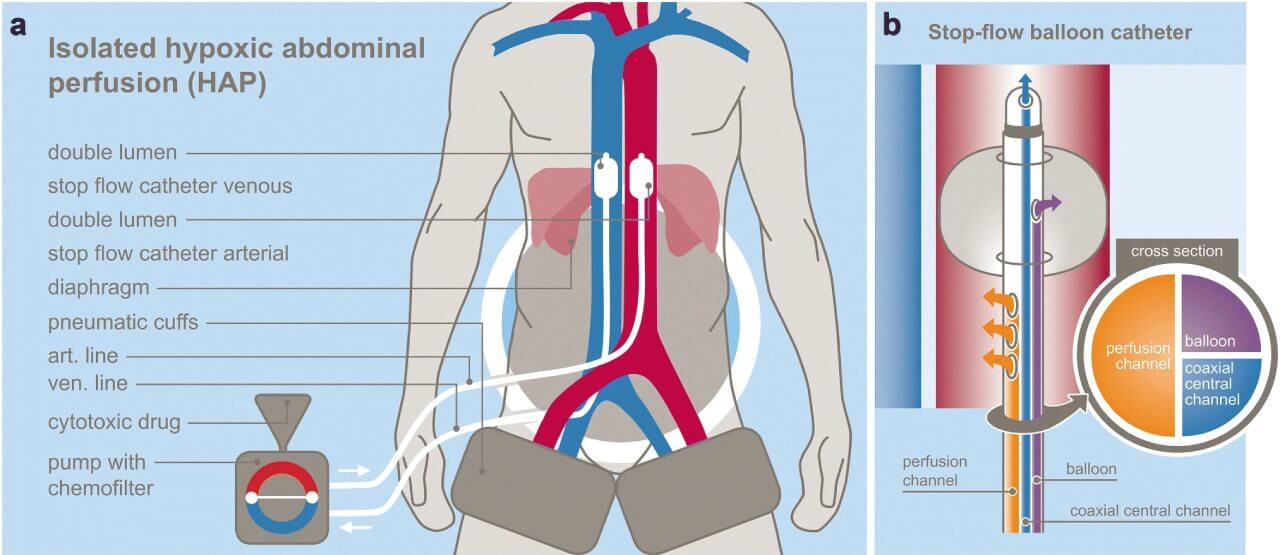
Передовые минимально инвазивные методы лечения
В Германии онкологи также предлагают вспомогательные малоинвазивные методы лечения рака поджелудочной железы, которые обеспечивают эффективный результат при данном онкологическом заболевании, сохраняя при этом пациенту достойное качество жизни.
Радиочастотная абляция (РЧА) и микроволновая абляция
Принцип действия этих методов лечения основан на прицельном воздействии тепловой энергии на онкологический очаг с целью уничтожения раковых клеток. За счет проведения процедур РЧА и МВА под визуальным контролем в режиме реального времени обеспечивается высокая точность лечения. Ключевые преимущества методик:
- Минимальная инвазивность лечения благодаря выполнению небольших разрезов для обеспечения доступа к опухоли
- Прицельное воздействие на опухолевую ткань
- Контроль за каждым этапом лечебной манипуляции в режиме реального времени с помощью передовых методов визуализации
- Возможность проведения лечения в амбулаторных условиях
- Быстрое восстановление пациента по сравнению с хирургическим лечением
Лечение рака поджелудочной железы в Германии предполагает применение терапевтических процедур, которые обеспечивают максимально эффективный результат с высоким профилем безопасности. Специалисты некоторых медучреждений сообщают о достижении локального контроля над опухолью в 65-80% в течение 12 месяцев после проведения РЧА и МВА.
Криоабляция
Криоабляция – это альтернативный термоабляции метод лечения, при котором вместо тепловой энергии для разрушения злокачественных клеток используется экстремальный холод. Данный вид терапии демонстрирует особенно многообещающие результаты в таких клинических ситуациях:
- Опухоли с локализацией вблизи критически важных кровеносных сосудов
- Новообразования, при которых требуется более строгий контроль над циклами замораживания и оттаивания опухолевых тканей
- Случаи, в которых критически важно сохранить целостность кровеносных сосудов вблизи онкологического очага
- Случаи, когда возникает необходимость в проведении нескольких сеансов лечения
Необратимая электропорация (НЭП)
Техника IRE, также известная как Нанонож, является одним из самых прогрессивных методов лечения рака поджелудочной железы в Германии. При проведении данного вида нетермической абляции применяются короткие высоковольтные электрические импульсы, с помощью которых в мембранах раковых клеток формируются постоянные поры, впоследствии вызывающие их гибель. Важным преимуществом метода наряду с его эффективностью является исключение повреждения целостности соседних анатомических структур. IRE расценивается в качестве особо важного метода при лечении:
- Опухолей, граничащих с критически важными кровеносными сосудами
- Онкологических очагов, прилегающих к желчным протокам
- Случаев рака поджелудочной железы, которые ранее считались неизлечимыми
- Случаев рака поджелудочной железы, при которых критически важно сохранить целостность близлежащих органов
Электрохимиотерапия (ЭХТ) при раке поджелудочной железы
Опухоли поджелудочной железы надежно себя защищают. Плотная фиброзная ткань окружает раковые клетки, блокируя проникновение химиопрепаратов – это объясняет, почему заболевание так упорно не поддается лечению.
Электрохимиотерапия использует контролируемые электрические импульсы для временного создания микроскопических пор в мембранах раковых клеток и более активного поступления препаратов внутрь. Образно говоря, ЭХТ отключает защиту клетки от концентрированного лекарства.
Во время процедуры хирурги располагают игольчатые электроды вокруг опухоли, размещая их на расстоянии от 2,5 до 3 сантиметров друг от друга. Компьютерный генератор координирует подачу импульсов – синхронизированную с сердцебиением через мониторинг ЭКГ для обеспечения безопасности. Каждая серия импульсов длится считанные секунды, но воздействие при этом достаточно сильное.
В отличие от системной химиотерапии, которая насыщает токсичными препаратами весь организм, ЭХТ воздействует только на область опухоли. В чем разница? Традиционные подходы растворяют препараты в 5-7 литрах крови до того, как они достигнут опухоли. ЭХТ доставляет концентрированные дозы именно туда, куда необходимо, и пациенты испытывают минимальные побочные эффекты.
Оценивая стоимость электрохимиотерапии и общую стоимость комбьинированного протокола, стоит помнить, что ЭХТ помогает избежать операции и достичь контроля над резистентным к лечению заболеванием. Пподробную информацию о новаторской работе профессора Айгнера с ЭХТ и методами регионарной химиотерапии вы найдете в интервью ниже.
Внутрибрюшная аэрозольная химиотерапия под давлением (PIPAC)
PIPAC – это новаторский метод лечения метастазов рака поджелудочной железы в брюшину. Суть процедуры состоит в следующем: врачи выполняют лапароскопическое вмешательство, в ходе которого химиотерапевтические препараты распыляются в брюшной полости в форме аэрозоля, что обеспечивает их лучшее проникновение в опухолевые ткани. Специалисты медицинских центров Германии внесли существенный вклад в разработку стандартизированных протоколов этого вида терапии, которая применяется в сочетании с системными методами лечения.
Все вышеперечисленные минимально инвазивные методы лечение обеспечивают пациенту ряд преимуществ, включая предельно короткие сроки восстановления после каждой из процедур, сохранение качества жизни и возможность применения этих лечебных манипуляций даже у ослабленных онкобольных с противопоказаниями к более агрессивным вмешательствам. При этом важно, что благодаря подобным малоинвазивным методикам лечения расширяется спектр терапевтических возможностей как для пациентов с впервые диагностированным раком поджелудочной железы, так и для онкобольных с поздними стадиями заболевания, которым требуется паллиативная помощь.
| Характеристика | Стандартные методы лечения | Инновационные методы лечения |
|---|---|---|
| Показатели 2-х летней выживаемости | ~25% на поздних стадиях рака | ~60% на поздних стадиях рака |
| Показатели ответа на лечение | Менее 10% | 45-65% |
| Продолжительность курса лечения | Несколько циклов в течение нескольких месяцев | До 4 сеансов |
| Побочные эффекты | Тяжелые побочные эффекты (тошнота, повышенная утомляемость, потеря волос, иммуносупрессия, раздражение кожи) | Незначительные побочные эффекты (дискомфорт в месте проведения лечебной манипуляции) |
| Стоимость в Германии | €80 000 - €150 000 за полный курс | €25 000 - €60 000 за полный курс |
| Стоимость в Великобритании | €90 000 - €165 000 за полный курс | €70 000 - €120 000 за полный курс |
| Стоимость в США | €100 000 - €180 000 за полный курс | €100 000 - €150 000 за полный курс |
Данные Booking Health. В таблице указана приблизительная стоимость лечения. Цены могут значительно отличаться в зависимости от сложности клинического случая, продолжительность пребывания в стационаре и потребности в последующем наблюдении или дополнительных лечебных мероприятиях. На стоимость лечения также могут повлиять дополнительные расходы на диагностические процедуры, логистику, проживание в гостинице или апартаментах.
История пациентки об успешном лечении рака поджелудочной железы в Германии
Личный опыт Ольги Вондрацковой из Чехии служит ярким примером эффективности комплексного подхода к лечению рака поджелудочной железы на поздних стадиях в Германии. У Ольги диагностировали рак поджелудочной железы с метастазами в печень. Она прошла лечение в двух специализированных клиниках Германии, в ходе которого для борьбы со сложным онкологическим диагнозом немецкие врачи использовали комбинацию из нескольких инновационных видов терапии.
Программа лечения Ольги состояла из двух этапов: сначала она прошла терапию дендритными клетками в Онкологической клинике LDG Laboratories в Берге под чутким руководством профессора Гансауге, после чего последовало проведение процедуры TACE в Университетской клинике им. Гёте во Франкфурте-на-Майне под кураторством профессора Томаса Фогля. Для Ольги была составлена индивидуальная схема лечения, направленная на лечение первичной опухоли поджелудочной железы и метастатического поражения других органов на фоне онкозаболевания.
Ольга и её сопровождающие лица отметили, что скоординированная помощь специалистов Booking Health существенно упростила её поездку на лечение в Германию. «Каждый этап лечения был организован на отлично», – утверждают они. Помимо превосходного медицинского обслуживания в клиниках, в которых Ольга проходила лечение, она особо высоко оценила индивидуальный подход переводчицы Велики, которая не только помогла с беспрепятственной коммуникацией с врачами, но и оказала Ольге неоценимую моральную поддержку.
Выбор в пользу передовых методов лечения рака поджелудочной железы в Германии открыл новые возможности для семьи Вондрацковых, которые, к сожалениею, не были доступны на родине. История Ольги является подтверждением того, что даже на поздних стадиях рака поджелудочной железы правильно подобранное современное лечение в сочетании с надлежащей координацией и поддержкой способно обеспечить прекрасный результат.
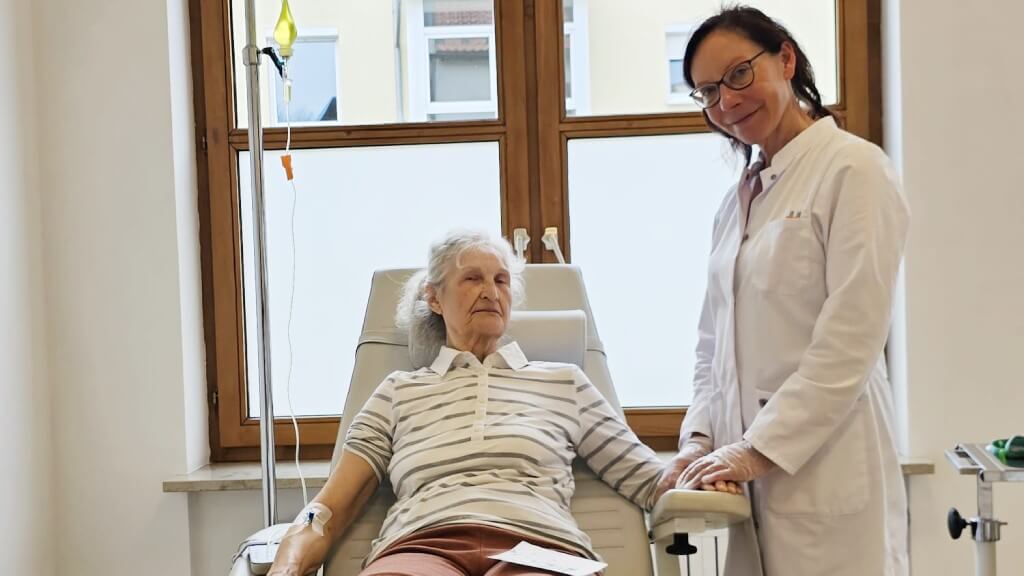
Особенности лечения рака поджелудочной железы на поздних стадиях
Многим пациентам с раком поджелудочной железы на поздних стадиях говорят об ограниченных возможностях лечения заболевания, из-за чего они теряют всякую надежду на благоприятный исход терапии. Однако благодаря инновационным терапевтическим методикам, которые успешно практикуются в Германии, у пациентов все же есть шанс продлить себе жизнь даже в тех случаях, когда традиционные протоколы бессильны.
Медицинские центры Германии являются первопроходцами в применении комплексных схем лечения, сочетающих традиционные и новаторские виды терапии. Такой революционный подход открывает абсолютно новые возможности перед пациентами с резистентными к стандартному лечению формами рака. К тому же включение в схему новаторских видов терапии снижает токсичность лечения.
Залогом эффективного лечения рака поджелудочной железы на поздних стадиях является составление для онкобольного индивидуальной схемы терапии с учетом особенностей его клинического случая. Каждый тип рака обладает уникальным молекулярным профилем, поэтому для успешной борьбы со злокачественной опухолью требуется определенный комплекс лечебных мероприятий. Он может включать:
- Иммунотерапию дендритными клетками с минимальным профилем побочных эффектов
- Таргетные методы лечения, например, TACE, при которых лекарственные средства доставляются непосредственно к онкологическому очагу
- Передовые виды противоболевой терапии и нутритивную поддержку
- Методы лечения, разработанные с учетом определенных биомаркеров и генетических особенностей опухоли
При надлежащей помощи в организации поездки на лечение за рубеж у пациентов есть возможность пройти лечение рака поджелудочной железы 4 стадии в Германии без необходимости ознакомления со сложными особенностями системы здравоохранения этой страны. Следует понимать, что выбор в пользу лечения в Германии открывает новые возможности даже для онкобольных с 3 и 4 стадиями рака.
Booking Health – надежный оператор медицинского туризма с безупречной репутацией
Самостоятельный поиск наилучшей тактики лечения с учетом вашей индивидуальной клинической ситуации – довольно сложная задача. Испытав на себе многочисленные курсы лечения, проконсультировавшись со множеством специалистов и испробовав различные терапевтические процедуры, вам может быть трудно сориентироваться во всей предоставленной врачами информации. В таком случае пациенты зачастую выбирают первый же предложенный вариант лечения или соглашаются на лечение с применением стандартизированных терапевтических протоколов, которое повлечет за собой множество побочных эффектов, вместо того, чтобы рассмотреть возможность терапии с помощью инновационных процедур.
Если вы хотите сделать осознанный выбор и получить лечение рака в соответствии с индивидуально разработанной для вас схемой с учетом особенностей вашей конкретной клинической ситуации, проконсультируйтесь с врачами-консультантами Booking Health. Компания Booking Health уже более 12 лет занимает ведущие позиции в сфере организации лечения за рубежом с применением новейших инноваций в медицине, поэтому ее специалисты обладают огромным опытом в составлении персонализированных комплексных программ лечения для каждого пациента. Booking Health пользуется репутацией авторитетной компании, которая предоставляет персонализированный подбор схемы лечения рака поджелудочной железы 4 стадии и клиники с прямым бронированием приема в медицинском центре, а также полную поддержку на каждом этапе лечения – от решения организационных вопросов до помощи в процессе лечения. Мы предлагаем:
- Оценку и анализ медицинских заключений пациента
- Составление индивидуальной программы лечения
- Подбор подходящего медицинского учреждения для лечения
- Подготовку медицинской документации и ее направление в выбранную пациентом для лечения клинику
- Консультации с врачами клиники в Германии для разработки оптимальной медицинской программы на этапе подготовки к поездке на лечение
- Экспертные консультации во время пребывания в больнице
- Последующее консультирование пациента после его возвращения на родину по завершению медицинской программы
- Решение организационных вопросов в рамках подготовки к поездке на лечение за границу
- Координацию пребывания пациента в другой стране, помощь в бронировании номера в отеле или апартаментов на период лечения
- Помощь в оформлении визы и бронировании авиабилетов
- Услуги переводчика и персонального координатора, который будет с вами на связи 24/7
- Прозрачные цены на лечение, без скрытых платежей
Здоровье – главная ценность в жизни каждого человека, доверять заботу о которой стоит лишь лучшим специалистам с богатым опытом и проверенной репутацией. Booking Health – это ваш надежный партнер, который оказывает всестороннюю помощь на пути к восстановлению здоровья и улучшению качества жизни. Свяжитесь с врачом-консультантом компании, чтобы узнать больше о возможностях персонализированного лечения метастатического рака поджелудочной железы у ведущих экспертов с использованием инновационных методов.
Инновации в онкологии: опыт пациентов Booking Health
Частые вопросы о лечении рака поджелудочной железы в Германии
Отправить запрос на лечениеВысококачественное лечение рака поджелудочной железы предоставляется в Университетской клинике им. Гёте Франкфурт-на-Майне, Онкологической клинике LDG Laboratories доктора Гансауге Берг и специализированных медицинских центрах в Мюнхене. В этих медучреждениях с пациентом работает междисциплинарная команда врачей с уникальным опытом в области онкохирургии, богатым практическим опытом проведения современных нехирургических методов лечения и высокоточных видов лучевой терапии.
Да, Германия занимает лидирующие позиции в сфере применения инновационных методов лечения рака поджелудочной железы, включая терапию дендритными клетками, TACE и малоинвазивные вмешательства. Немецкие центры проводят новаторские исследования, посвященные изучению иммунотерапевтических методов, которые позволяют повысить показатели выживаемости на поздних стадиях рака примерно на 60% по сравнению с 25% при стандартном подходе к терапии.
Стоимость лечения рака поджелудочной железы в Германии варьируется в зависимости от применяемого метода: стоимость традиционной химиотерапии и лучевой терапии составляет от 21 100 до 58 400 евро за процедуру/цикл лечения, PIPAC – от 18 000 до 20 000 евро, терапии дендритными клетками – от 20 000 до 38 000 евро. Эти виды терапии потенциально обеспечивают высокие шансы на излечение рака, при этом их стоимость в Германии значительно ниже, чем в Великобритании и США.
Немецкие хирургические центры являются лучшими в области проведения операции Уиппла – сложного хирургического вмешательства, предназначенного для лечения злокачественных опухолей органов пищеварительной системы. Благодаря применению усовершенствованных техник врачам в Германии удается сократить сроки восстановления пациента в послеоперационном периоде, снизить количество осложнений и улучшить функциональные результаты операции. Следовательно, Германия является одной из лучших стран мира для проведения этого специализированного хирургического вмешательства.
Иностранные пациенты регулярно проходят лечение рака поджелудочной железы в Германии при поддержке агентств медицинского туризма, которые координируют лечение, обеспечивают языковую поддержку и помогают в решении логистических вопросов. Благодаря работе таких агентств инновационные методы лечения сейчас доступными пациентам из разных стран мира.
Для получения «второго мнения» пациенты могут воспользоваться услугами компании Booking Health, которая помогает предоставить медицинские документы в немецкие центры, специализирующиеся на лечении рака поджелудочной железы. Booking Health предлагает организацию онлайн-консультаций с немецкими врачами перед поездкой на лечение, в ходе которой пациент может получить экспертную оценку своего диагноза и предложение по возможным вариантам лечения от ведущих онкологов.
Да, крупные немецкие онкологические центры обладают международной аккредитацией, гарантирующей высокие стандарты качества медицинского обслуживания. Медучреждения в этой стране регулярно проходят строгие проверки на соответствие европейским и международным стандартам в области онкологии и требованиям сертификации.
Выбирайте лечение за рубежом и Вы, несомненно, получите отличный результат!
Авторы:
Статья составлена под редакцией экспертов в области медицины, врачей-специалистов доктора Надежды Иванисовой и доктора Вадима Жилюка. Для лечения состояний, о которых идет речь в статье, необходимо обратиться к врачу; информация в статье не предназначена для самолечения!
С редакционной политикой, которая отражает наше стремление к точности и прозрачности, можно ознакомиться здесь. Перейдите по ссылке, чтобы ознакомиться с нашими правилами.
Источники:
[4] Aigner, K.R., Gailhofer, S., Selak, E. et al. Intra-arterial infusion chemotherapy versus isolated upper abdominal perfusion for advanced pancreatic cancer: a retrospective cohort study on 454 patients. J Cancer Res Clin Oncol 145, 2855–2862 (2019). https://doi.org/10.1007/s00432-019-03019-6. [DOI]
Читайте:
Современные методы лечения рака поджелудочной железы
Лечение рака поджелудочной железы дендритными клетками в Германии
Меню статьи:
- Общие данные о раке поджелудочной железы и особенностях этого заболевания
- Традиционные подходы к лечению
- Инновационное лечение рака поджелудочной железы дендритными клетками
- Таргетное лечение рака методом TACE с доставкой химиопрепаратов непосредственно к опухоли
- Регионарная химиотерапия при раке поджелудочной железы
- Передовые минимально инвазивные методы лечения
- История пациентки об успешном лечении рака поджелудочной железы в Германии
- Особенности лечения рака поджелудочной железы на поздних стадиях
- Booking Health – надежный оператор медицинского туризма с безупречной репутацией
- Частые вопросы о лечении рака поджелудочной железы в Германии
Не знаете, с чего начать?
Свяжитесь с Booking Health
